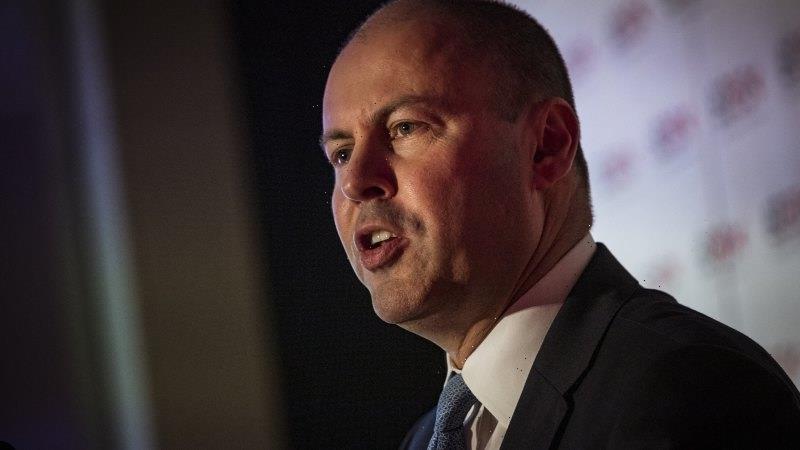For our free coronavirus pandemic coverage, learn more here.
Federal Treasurer Josh Frydenberg has warned the nation could fall into a second recession if the Greater Sydney lockdown failed to contain the coronavirus outbreak, as industry groups say home builder grants won’t be as effective to drive another economic recovery.
The economy is expected to shrink over the September quarter due to the extended restrictions in NSW, Mr Frydenberg said. A recession is defined as two consecutive quarters of negative growth, which means the next few months are critical.
Federal Treasurer Josh Frydenberg.Credit:Chris Hopkins
“With respect to the December quarter, that does depend to a large extent how successful NSW, our largest state economy, is in getting on top of this virus,” Mr Frydenberg said. “That’s why people need to follow the health advice and that’s why it’s also important for our economy that both South Australia and Victoria have come out of these lockdowns.”
Analysis released on Friday by EY suggests the current lockdown will reduce GDP by 2.5 percentage points in the September quarter, enough to drive it into negative territory, but an economic rebound is expected in the final quarter.
Australia was plunged into its first recession in 30 years last year due to the pandemic, with a sharp 7 per cent contraction in the June quarter, but rebounded quickly on the back of billions of dollars of government spending and support including building grants and a historic wage subsidy program.
The HomeBuilder scheme gave new home builders and renovators a $25,000 grant and prompted a massive spike in building activity. The offer was later extended but at the lower rate of $15,000 and was closed to new applicants in mid-April.
However, the Housing Industry Association, AI Group and the Urban Taskforce are not calling for a reintroduction of the grants, instead warning the pipeline is full and there are skills shortages due to the continued closure of international borders. This could mean the government will need to rely on other levers to assist with the recovery.
EY chief economist Jo Masters said the country would lose about 35 million working hours a week because of the Sydney lockdowns with one of the biggest hits due to restrictions on the construction sector.
She said while the economy would suffer through the September quarter, it was likely to rebound through the final three months of the year. “The most likely outcome remains that the economy will likely expand in the December quarter and thereby avoid Australia entering a technical recession,” she said.
“Expansion and contraction are based around the whole three month period, which means that across the December quarter restrictions would have to be, on average, longer and tougher, across more places, than they were in the September quarter.”
The federal government expects a sharp economic rebound after the lockdowns, but stimulus measures like HomeBuilder are unlikely to be reintroduced. Housing Industry Association chief economist Tim Reardon said the grants helped last year but with a hefty pipeline of work yet to be completed in NSW they would no longer be as useful.
“The best response is to give builders the opportunity to get on and complete that work. The volume of work will continue into 2022,” he said.
He said a bigger issue facing the industry is skills shortages, exacerbated by the closure of international borders.
Urban Taskforce chief executive Tom Forrest wants HomeBuilder to be redirected into a new scheme focused on encouraging councils to approve home building applications.
“We call for the governments to offer councils a $15,000 per new dwelling approval grant for the delivery of local infrastructure,” Mr Forrest said. “This would be payable to the Council when construction commences and would fund local roads, public green space and open space and essential local infrastructure.”
AI Group chief executive Innes Willox said immediate support was critical but there “may need to take a fresh look at options for general macroeconomic stimulus” when it is clear how much longer lockdowns and restrictions will continue.
At the moment he said there was plenty of stimulus with support packages rolled out and the unemployment rate was below 5 per cent ahead of the latest lockdowns.
He said this was “the lowest in a decade, and with skill shortages biting across a wide cross-section of the economy”.
Data from Google compiled by ANZ economists headed by Charlotte Heck-Parsch shows a sharp drop in measures of mobility both across NSW and across the rest of the country in the wake of the recent lockdowns.
The same data shows a spike in searches amongst people in NSW for information about government support, reaching its highest level on record.
Also at an all-time high are searches for the term “vaccinations” in a sign people are responding to pleas from the medical community and political leaders for residents to get inoculated against the coronavirus.
The Morning Edition newsletter is our guide to the day’s most important and interesting stories, analysis and insights. Sign up here.
Most Viewed in Politics
From our partners
Source: Read Full Article

